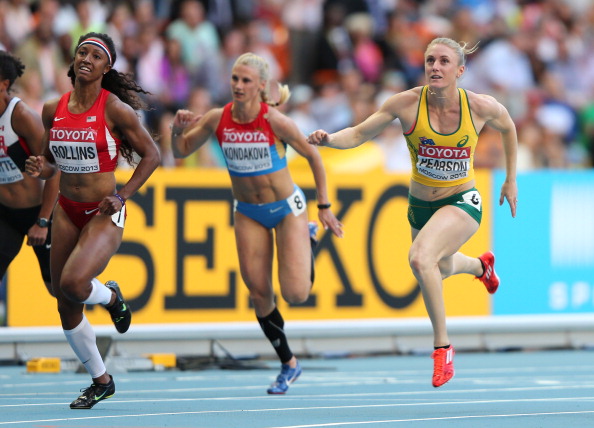It's an unusual thing, indeed, when Usain Bolt storms to victory -- this time, in the 200 meters -- and he is not the star of the show on an action-packed night at the world championships at Luzhniki Stadium in Moscow. That would be the new sensation of the women's 100 meter hurdles, Brianna Rollins of the United States, who -- in a race that many track aficionados had been looking forward to as the showdown of the meet -- came from behind to defeat the reigning Olympic champion, Sally Pearson of Australia.
Rollins' winning time: 12.44.
Pearson's: 12.5 flat.
Ponder this:
Rollins has made herself, in one year, NCAA champion, U.S. champion and, now, world champion. She finished up at Clemson this spring. She turns 22 tomorrow. She has now won 34 straight races, including heats, across four different disciplines.
Rollins ran an American-record 12.26 to win the U.S. outdoors in June. That 12.44 is her third-fastest time of the year even though it was run into a slight -- 0.6 meters per second -- headwind.
"I'd call it a great year for me," Rollins said. "I'd call it a blessed year."
As Benita Fitzgerald Mosley, the 1984 Los Angeles Games 100 hurdles gold medalist, now the U.S. Olympic Committee's chief of organizational excellence, put it in a telephone interview, Brianna Rollins "is something else -- she really is."
As for Bolt, who had dropped a starting block on his foot in the 200 heats but then got himself taped up and ran, anyway:
Sitting in the blocks, now his style, he got off to the slowest start in the field but nonetheless, as usual, had the race won by the curve. He eased up and still finished in 19.66.
By anyone else's standards, 19.66 would be extraordinary.
For all the understandable to-do about what Bolt does in the 100, the 200 always has been his best event.
To show how he has re-ordered time: 19.66 is his 10th-best 200 mark. Of course he holds the world-record in the event, 19.19, set at the 2009 world championships in Berlin.
Jamaica's Warren Weir, the London 200 bronze medalist, took second, in 19.79.
American Curtis Mitchell prevented a Jamaican sweep by coming on hard in the final 50 meters, finishing in 20.04 for third.
This is how close it was for third: Jamaica's Nickel Ashmeade crossed in 20.05 for fourth.
It was the first time in 200 history that all eight guys went a wind-legal 20.37 or faster.
Some more facts and figures to underscore not only Bolt's place in the record books but his hold on the imagination:
-- He became the first to win the 100-200 sprint double twice at the world championships.
-- His third 200 worlds gold surpasses Michael Johnson and Calvin Smith.
-- He now has seven world gold medals to go with the six he has won at the Olympics. A presumed eighth, the 4x100 relay, is coming up Sunday.
Pearson came into the women's 100 hurdles after overcoming an early-season hamstring problem. She ran 12.62 in the heats, then threw down a 12.5 in the semifinal, the fastest qualifying time, signaling that she was indeed ready to go.
Make no mistake: Sally Pearson is a big-game racer.
Rollins ran 12.55 in the heats, 12.54 in the semifinals.
This would be, of course, Rollins' first major international final. Also in Saturday's final: Dawn Harper, the 2008 Beijing gold medalist and 2012 London silver medalist.
In the first half of the race, it looked as if Pearson might just pull it off.
Rollins reacted horribly to the gun, 0.263. Pearson, meanwhile, got off to a good start, 0.154, and led through the first few hurdles.
But Rollins eventually made her move, passing Pearson over the eighth and ninth hurdles.
With the victory, Americans won both the women's and men's sprint hurdles at the worlds for the third time; David Oliver won the men's 110 hurdles on Monday. Americans won previously in 1995 and 2001.
"Today I didn't have the best start but I didn't panic," Rollins said. "I was just focusing on my own lane and working hard, trying to finish strong. Today was about the victory, not about the time. The fast times will come. I have a huge respect for Sally Pearson. She is a great athlete and it was great to compete with her today. I was nervous but nervousness is normal. It's just about the way you handle it."
For her part, Pearson said, "Of course you are going to a race to win but I am satisfied. It is not gold but the best I could produce tonight. It was a hard year for me. In July, others were smashing me. Tonight I was only beaten by one. Next year, I won't be getting any silver!"
Great Britain's Tiffany Porter ran a personal-best 12.55 for third place, Britain's first women's 100 hurdles medal at a world championships. Harper took fourth in 12.59, with another American, Queen Harrison, fifth in 12.73.
"It was a horrible race, and I don't know what happened," Harper said.
In other action, the illustrious Meseret Defar of Ethiopia won the women's 5000 meters, in 14:50.19, the fastest time in the race at the worlds in eight years -- despite a last 200 meters run in a relatively pedestrian 29.43.
Defar is 5-foot-3, 92 pounds of tough. Her record:
Three Olympic 5k medals -- 2012 and 2004 gold, 2008 bronze.
Five worlds 5k medals, a record -- two golds, one silver, two bronze.
In her typically understated way, Defar said afterward, "It is a big achievement for me."
Molly Huddle finished sixth in 15:05.73, the best finish ever by an American.
The U.S. women's 4x400 relay team's world championship winning streak -- five -- came to an end. Russia won, in 3:20.19. The Americans -- running without the injured Allyson Felix -- took second, in 3:20.41. Great Britain came in third, in 3:22.61.
In the women's high jump, Russia's Svetlana Shkolina, the 2012 bronze medalist, took gold Saturday at 2.03 meters, or 6 feet, 8 inches. American Brigetta Barrett, the London silver medalist, took second again; she cleared 2.00, or 6 6-3/4, but not 2.03.
"Two silver medals in the course of 12 months -- it's been one heck of a year," Barrett said later.
Finally, this:
Kenya's previous best performance at the worlds in any field event had been 15th in the triple jump qualifying.
In the men's javelin, won by the Czech Republic's Vitezslav Vesley with a throw of 87.17 meters, or 286 feet, Kenya's Julius Yego took fourth. He threw a national-record 85.40, or 280-2.



